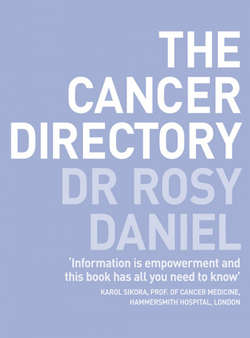Читать книгу The Cancer Directory - Dr. Daniel Rosy - Страница 74
Getting more details
ОглавлениеWhen your specialists tell you about your treatment options, it is important to establish the details of the proposed treatment so that you can make an informed decision.
As you focus on a particular treatment as the most likely one for you, make sure to ask the following questions:
• What will the treatment involve?
• When and where will it take place?
• Who will be responsible for my treatment?
• How long will it continue for?
• How will it make me feel?
• How long should I take off work for treatment and convalescence afterwards?
• What side-effects can it cause?
• How long will it take me to get over these side-effects?
• Will these side-effects be permanent or temporary?
• What are the benefits of the treatment in terms of prolonged survival, symptom improvement or disease-free interval (the time you can expect to enjoy with no problems from the cancer)?
• Are there any extra (adjuvant) treatments that might further improve my well-being or chances of survival while having this treatment?
• Does the doctor see any problem with my taking vitamin/mineral supplements alongside the treatment (making sure his or her opinion is a well-informed one)?
• Does the doctor know of any promising ‘medical frontier’ treatments or trials that might offer a better chance of prolonged survival than the treatment I am being offered and, if so, where are these treatments available and at what cost?
Once you are in possession of this information, you will be able to decide whether the side-effects (temporary and permanent) of the treatment outweigh the possible benefits you may receive in terms of symptom improvement and life expectation.
You may find this in-depth questioning of your doctors too difficult to go through. Some people do not want to know exactly where cancer is in their bodies if it is not causing problems nor do they want to pin their doctors down to telling them the exact facts about the effectiveness of the treatments being offered, as this may inhibit their being able to put 100 per cent of their faith in the treatment.
However, I would strongly recommend that, at the very least, you get a clear diagnosis of the primary tumour so that you are certain that you do have cancer, and get some indication of how serious your situation may be. In this way, you can make an informed decision about whether to go ahead with conventional treatment or not with an assessment of the risks involved if you do not feel able to undergo medical treatment.
